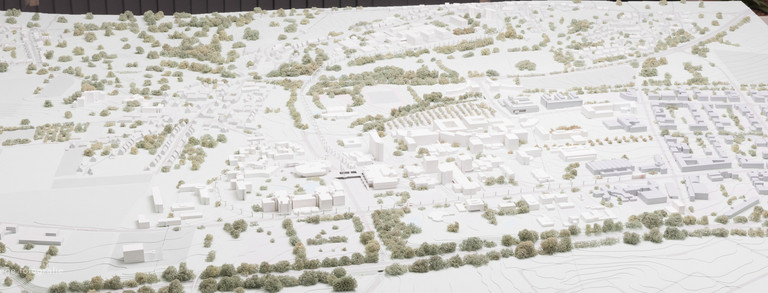NAWISWF / Sustainable economic commercial in South Westphalia
In North Rhine-Westphalia's strongest industrial region, South Westphalia, companies will continue to need high-quality industrial and commercial sites for further economic development in the future. However, the timely, high-quality and needs-based provision of economic areas by regional planning and local authorities is increasingly proving to be an obstacle to development, particularly in this topographically and naturally challenging region. In addition, there are new requirements for GI/GE. In addition to space-saving planning, these areas should be optimally used and densely built on and have adequate traffic, digital and energy-sustainable development. This means making better use of parking spaces and equipping them with charging infrastructure, optimizing the building fabric and production facilities to conserve energy and resources and creating climate resilience. To this end, following an inventory at 13 selected locations in South Westphalia and in consultation with the municipalities, specific requirements in the above-mentioned fields of action are to be defined, individual solutions developed and pooling and business models for shared facilities developed.
Duration: 01.01.2024-31.12.2026
Goal
The aim is to develop integrated solutions for sustainable economic areas in cooperation with the participating project partners and local authorities. The focus is on issues relating to
- land-saving and climate-resilient planning and construction of development facilities and future buildings;
- climate-neutral or at least low-emission energy supply;
- climate-neutral or low-emission mobility of people and goods;
- resource efficiency in production processes and buildings;
- Identification of companies that apply efforts to increase their sustainability and energy efficiency that go beyond the state of the art in the industry and are therefore suitable as a target group for the business parks.
Approach
SRP analyzes the planned sites and plans for new industrial and commercial areas in the region and assesses them in terms of their topographical location, heavy rainfall events, accessibility, etc. In a second step, SRP determines the planning potential for space-saving construction and the integration of water management and energy management issues. This also includes the development of commercial area typologies and the analysis of possible conflicts of objectives and solutions. Subsequently, the focus is on the development of planning measures at the specific neighborhood and district level (planning principles and principles for the design of sustainable and climate-resilient commercial areas, etc.), the derivation and preparation of planning measures at the building and plot level and the coordination of (planning and construction) measures on public areas and private properties. All of this, together with the results of the project partners, will be incorporated into the development of a guideline that will provide local authorities with an application-oriented overview of urban planning concepts, planning options and control options as well as planning and building law options for sustainable industrial and commercial areas.
Project Partners & Funding
Ansprechpartner
TU Dortmund University, Faculty of Spatial Planning, Urban and Regional Planning, Frank Othengrafen







